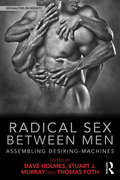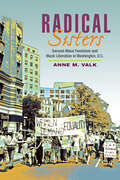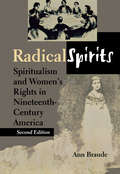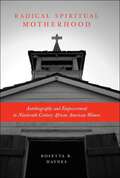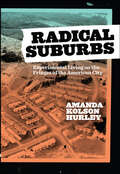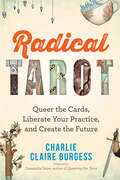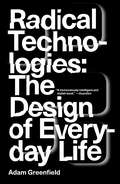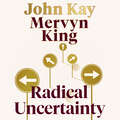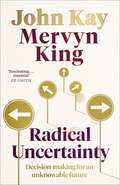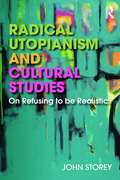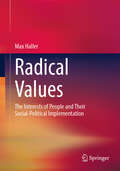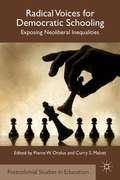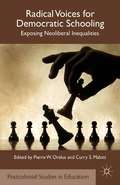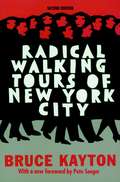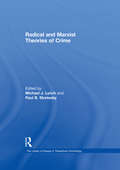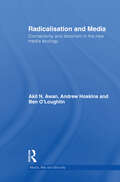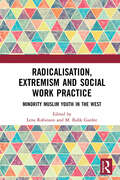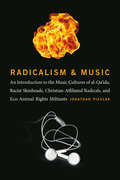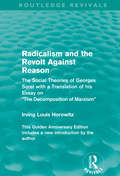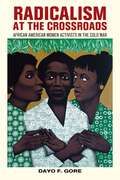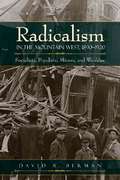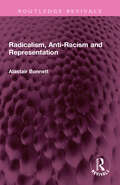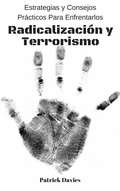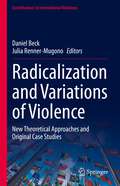- Table View
- List View
Radical Sex Between Men: Assembling Desiring-Machines (Sexualities in Society)
by Dave Holmes Stuart J. Murray Thomas FothBringing together theory and public health practice, this interdisciplinary collection analyses three forms of nonconventional or radical sexualities: bareback sex, BDSM practices, and public sex. Drawing together the latest empirical research from Brazil, Canada, Spain, and the USA, it mobilizes queer theory and poststructuralism, engaging the work of theorists such as Bataille, Butler, Deleuze and Guattari, and Foucault, among others. While the collection contributes to current research in gender and sexuality studies, it does so distinctly in the context of empirical investigations and discourses on critical public health. Radical Sex Between Men: Assembling Desiring-Machines will be of interest to advanced undergraduate students, postgraduate students, and researchers in gender and sexuality studies, sexology, social work, anthropology, and sociology, as well as practitioners in nursing, medicine, allied health professions, and psychology.
Radical Sisters: Second-Wave Feminism and Black Liberation in Washington, D.C. (Women, Gender, and Sexuality in American History)
by Anne M. ValkRadical Sisters offers a fresh exploration of the ways that 1960s political movements shaped local, grassroots feminism in Washington, D.C. Rejecting notions of a universal sisterhood, Anne M. Valk argues that activists periodically worked to bridge differences for the sake of alleviating women's plight, even while maintaining distinct political bases. While most historiography on the subject tends to portray the feminist movement as deeply divided over issues of race, Valk presents a more nuanced account, showing feminists of various backgrounds both coming together to promote a notion of "sisterhood" and being deeply divided along the lines of class, race, and sexuality.
Radical Social Change in the United States
by Joanna SwangerThis book tackles the question of why the United States is so resistant to radical change towards economic justice and peace. Taking full stock of the despair that launched the popular support for Bernie Sanders and Donald Trump, Swanger historicizes the political paralysis of post-1974 United States that deepened already severe economic inequalities, asking how the terrain for social movements in the early twenty-first-century US differs from that of the 1960s. This terrain is marked by the entrenchment of neoliberalism, anti-intellectualism, and difficulties paradoxically posed by the ease of social media. Activists now must contend with a paralyzing "post-factual" moment. Alain Badiou's thought informs this book on breaking through contemporary political paralysis.
Radical Spirits: Spiritualism and Women's Rights in Nineteenth-Century America
by Ann Braude“Braude has discovered a crucial link between the early feminists and the spiritualists who so captured the American imagination.” —Los Angeles TimesIn Radical Spirits, Ann Braude contends that the early women’s rights movement and Spiritualism went hand in hand. Her book makes a convincing argument for the importance of religion in the study of American women’s history.In this new edition, Braude discusses the impact of the book on the scholarship of the last decade and assesses the place of religion in interpretations of women’s history in general and the women’s rights movement in particular. A review of current scholarship and suggestions for further reading make it even more useful for contemporary teachers and students.“It would be hard to imagine a book that more insightfully combined gender, social, and religious history together more perfectly than Radical Spirits. Braude still speaks powerfully to unique issues of women’s creativity—spiritual as well as political—in a superb account of the controversial nineteenth-century Spiritualist movement.” —Jon Butler, Howard R. Lamar Professor Emeritus of American Studies, History, and Religious Studies at Yale University“Continually rewarding.” —The New York Times Book Review“A fascinating, well-researched, and scholarly work on a peripheral aspect of the rise of the American feminist movement.” —Library Journal“A vitally important book . . . [that] has . . . influenced a generation of young scholars.” —Marie Griffith, associate director of the Center for the Study of Religion, Princeton University“An insightful book and a delightful read.” —Journal of American History
Radical Spiritual Motherhood: Autobiography and Empowerment in Nineteenth-Century African American Women
by Rosetta R. HaynesIn this cutting-edge work, Rosetta R. Haynes explores the spiritual autobiographies of five nineteenth-century female African American itinerant preachers to discover the ways in which they drew upon religion and the material conditions of their lives to fashion powerful personas that enabled them to pursue their missions as divinely appointed religious leaders. Haynes examines the lives and narratives of Jarena Lee (1783--?), Zilpha Elaw (c. 1790--?), Julia Foote (1823--1900), Amanda Berry Smith (1837--1915), and Rebecca Cox Jackson (1795--1871) through an innovative conceptual framework Haynes terms "radical spiritual motherhood" -- an empowering identity deriving from the experience of "sanctification," a kind of spiritual perfection following conversion. Drawing upon conventional nineteenth-century standards for motherhood, radical spiritual motherhood also challenges traditional standards: These were women whose religious missions authorized them to preach in public, to assume an activist role, and to declare sexual autonomy through celibacy. They redefined their relationships to the powers that be by becoming instruments of God in a kind of protofeminist gesture. Haynes uses historical methods, feminist literary theory, and liberation theology to investigate the ways these women, as reflected especially in their autobiographies, employed the idea of motherhood to fashion strong, authentic identities as women called to preach the gospel.Though radical spiritual motherhood is an identity specifically adopted by free black women, the lives and texts of these itinerant preachers retain close ties to those of enslaved black women through the negative cultural stereotypes assigned to both groups. To illustrate this connection, Haynes analyzes the writings of the preachers within the context of the narratives of former slaves Harriet Jacobs, Mary Prince, and Sojourner Truth. Haynes also links the lineage of radical spiritual motherhood to a modern woman by considering Pauli Murray (1910--1985), the first African American woman (and the second African American) to be ordained as an Episcopal priest. By looking at Murray's intellectual and spiritual development, especially her feminist ideologies, social activism, and espousal of liberation theology, Haynes shows that Murray was in fact a modern-day radical spiritual mother.Pioneering and accessible, Radical Spiritual Motherhood marks a turning point in the study of both African American literature and women's studies.
Radical Suburbs: Experimental Living on the Fringes of the American City
by Amanda Kolson Hurley&“A revelation . . . will open your eyes to the wide diversity and rich history of our ongoing suburban experiment.&” —Richard Florida, author of The Rise of the Creative Class America&’s suburbs are not the homogenous places we sometimes take them for. Today&’s suburbs are racially, ethnically, and economically diverse, with as many Democratic as Republican voters, a growing population of renters, and rising poverty. The cliche of white picket fences is well past its expiration date. The history of suburbia is equally surprising: American suburbs were once fertile ground for utopian planning, communal living, socially-conscious design, and integrated housing. We have forgotten that we built suburbs like these, such as the co-housing commune of Old Economy, Pennsylvania; a tiny-house anarchist community in Piscataway, New Jersey; a government-planned garden city in Greenbelt, Maryland; a racially integrated subdivision (before the Fair Housing Act) in Trevose, Pennsylvania; experimental Modernist enclaves in Lexington, Massachusetts; and the mixed-use, architecturally daring Reston, Virginia. Inside Radical Suburbs you will find blueprints for affordable, walkable, and integrated communities, filled with a range of environmentally sound residential options. Radical Suburbs is a history that will help us remake the future and rethink our assumptions of suburbia. &“The communities Kolson Hurley chronicles are welcome reminders that any place, even a suburb, can be radical if you approach it the right way.&” —NPR &“Radical Suburbs overturns stereotypes about the suburbs to show that, from the beginning, those &‘little boxes&’ harbored revolutionary ideas about racial and economic inclusion, communal space, and shared domestic labor. Amanda Kolson Hurley&’s illuminating case studies show not just where we&’ve been but where we need to go.&” ―Alexandra Lange, author of The Design of Childhood
Radical Tarot: Queer the Cards, Liberate Your Practice, and Create the Future
by Charlie Claire BurgessA dynamic re-envisioning of the tarot, including tarot card imagery, that describes how the tarot is queer, that the archetypes are alive, and that tarot doesn&’t tell the future; it creates it.Radical Tarot meets the tarot in a space of evolution, deconstruction, and creation, using the historical and common meanings of the cards as a launchpad for digging into limiting beliefs and societal conditioning and unlocking the personal truths beneath.The Fool&’s Journey is re-envisioned as a journey to non-binary thinking, the gender essentialism is ousted from the Major Arcana and the Court Cards—and all the cards—are reframed through a non-hierarchical, anti-capitalist, and intersectional lens. The archetypes are re-imagined in modern, progressive, and queered contexts. For example:The Empress and the body positivity movement Justice, not in the legal sense, but as ethical discernment and accountabilityTemperance and transcending the gender binaryThe Devil and anti-capitalismJudgement and revolutionRadical Tarot also touches on Charlie&’s personal story of how tarot helped them embrace their queerness, leave their marriage, and radically change their life. It speaks to their queer awakening and how tarot became, for them, a tool for social justice and conscious awareness of the world around them. Their words and experience will help anyone who wishes to be closer to their own authentic selves.
Radical Technologies: The Design of Everyday Life
by Adam GreenfieldA field manual to the technologies that are transforming our livesEverywhere we turn, a startling new device promises to transfigure our lives. But at what cost? In this urgent and revelatory excavation of our Information Age, leading technology thinker Adam Greenfield forces us to reconsider our relationship with the networked objects, services and spaces that define us. It is time to re-evaluate the Silicon Valley consensus determining the future. We already depend on the smartphone to navigate every aspect of our existence. We’re told that innovations—from augmented-reality interfaces and virtual assistants to autonomous delivery drones and self-driving cars—will make life easier, more convenient and more productive. 3D printing promises unprecedented control over the form and distribution of matter, while the blockchain stands to revolutionize everything from the recording and exchange of value to the way we organize the mundane realities of the day to day. And, all the while, fiendishly complex algorithms are operating quietly in the background, reshaping the economy, transforming the fundamental terms of our politics and even redefining what it means to be human. Having successfully colonized everyday life, these radical technologies are now conditioning the choices available to us in the years to come. How do they work? What challenges do they present to us, as individuals and societies? Who benefits from their adoption? In answering these questions, Greenfield’s timely guide clarifies the scale and nature of the crisis we now confront —and offers ways to reclaim our stake in the future.
Radical Uncertainty: Decision-making for an unknowable future
by John Kay Mervyn KingLONGLISTED FOR THE FT/MCKINSEY BUSINESS BOOK OF THE YEAR AWARD 2020'A brilliant new book' Daily Telegraph'Well written . . . and often entertaining'The Times'A sparkling analysis'Prospect'Entertaining and enlightening . . . This is a necessary critique and they make it with verve, knowledge and a wealth of stories' Financial Times'An elegant, wise and timely book' Irish Times'Jam-packed with erudition' New StatesmanThis major, critically acclaimed work asks a vitally important question for today: when uncertainty is all around us, and the facts are not clear, how can we make good decisions? We do not know what the future will hold, particularly in the midst of a crisis, but we must make decisions anyway. We regularly crave certainties which cannot exist and invent knowledge we cannot have, forgetting that humans are successful because we have adapted to an environment that we understand only imperfectly. Throughout history we have developed a variety of ways of coping with the radical uncertainty that defines our lives. This incisive and eye-opening book draws on biography, history, mathematics, economics and philosophy to highlight the most successful - and most short-sighted - methods of dealing with an unknowable future. Ultimately, the authors argue, the prevalent method of our age falls short, giving us a false understanding of our power to make predictions, leading to many of the problems we experience today.
Radical Uncertainty: Decision-making for an unknowable future
by John Kay Mervyn KingLONGLISTED FOR THE FT/MCKINSEY BUSINESS BOOK OF THE YEAR AWARD 2020'A brilliant new book' Daily Telegraph'Well written . . . and often entertaining'The Times'A sparkling analysis'Prospect'Entertaining and enlightening . . . This is a necessary critique and they make it with verve, knowledge and a wealth of stories' Financial Times'An elegant, wise and timely book' Irish Times'Jam-packed with erudition' New StatesmanThis major, critically acclaimed work asks a vitally important question for today: when uncertainty is all around us, and the facts are not clear, how can we make good decisions? We do not know what the future will hold, particularly in the midst of a crisis, but we must make decisions anyway. We regularly crave certainties which cannot exist and invent knowledge we cannot have, forgetting that humans are successful because we have adapted to an environment that we understand only imperfectly. Throughout history we have developed a variety of ways of coping with the radical uncertainty that defines our lives. This incisive and eye-opening book draws on biography, history, mathematics, economics and philosophy to highlight the most successful - and most short-sighted - methods of dealing with an unknowable future. Ultimately, the authors argue, the prevalent method of our age falls short, giving us a false understanding of our power to make predictions, leading to many of the problems we experience today.
Radical Utopianism and Cultural Studies: On Refusing to be Realistic
by John StoreyIn Radical Utopianism and Cultural Studies, John Storey looks at the concept of utopianism from a cultural studies perspective and argues that radical utopianism can awaken the political promise of cultural studies. Between the Preface and the Postscript, there are seven chapters that explore different aspects of radical utopianism. The book begins with a definition of what radical utopianism means, with its productive combination of defamiliarization and desire. From there, it considers Thomas More’s invention of the concept of utopia with its double articulation of what is and what could be, Herbert Marcuse’s utopian rereading of Sigmund Freud’s concept of repression, Gerrard Winstanley and the Diggers, the Paris Commune, and the Haight-Ashbury counterculture. In the final chapter, Storey examines two versions of utopian capitalism: retro and post. Although the main focus here is on Donald Trump’s presidential election campaign and Paul Mason’s recent bestseller Postcapitalism, the chaper begins with a brief discussion of Karl Marx on capitalism. Each chapter, in a different way, argues that radical utopianism defamiliarizes the manufactured naturalness of the here and now, making it conceivable to believe that another world is possible. This book provides an ideal introduction to utopianism for students of cultural studies as well as students within a number of related disciplines such as sociology, literature, history, politics, and media studies.
Radical Values: The Interests of People and Their Social-Political Implementation
by Max HallerA famous and frequently quoted sentence by Max Weber states: &“Interests, not ideas, directly govern the actions of people. However, the &‘worldviews&’ created by &‘ideas&’ have often determined the paths in which the dynamics of interests propelled action.&” Recent sociology, however, has not done justice to this principle. Values and their effects are either assumed to be given (as in the case of Talcott Parsons) or considered entirely irrelevant (as in Rational Choice and System Theory). Extensive empirical research on values has yielded many results but has largely lacked a theoretical foundation, making its findings often contestable. Weber himself provided only unsatisfactory answers regarding the relevance of values: The decision for specific values is a purely individual matter, and there is an irreconcilable struggle between different values. This book comprehensively examines this issue for the first time in sociology and finds a new, constructive, and explanatory solution - drawing on authors such as Immanuel Kant, George H. Mead, and Raymond Boudon. It is utilizing considerations from philosophy, social theory, and empirical social research, as well as incorporating historical struggles for the recognition and enforcement of values. It can be determined that there are fundamental societal values, that their number can be clearly defined, and that there is not necessarily conflict between them, but rather complementarity. With these theses and findings, this book can be regarded as a new sociological standard work. It is also of fundamental importance for students and researchers in many other humanities and social science disciplines.
Radical Voices for Democratic Schooling: Exposing Neoliberal Inequalities (Postcolonial Studies In Education)
by Pierre W. Orelus Curry S. MalottComprised of in-depth interviews and conversations with key figures in education and activism that thoroughly examine the intersection of neoliberalism, neocolonialism, and racism, this first-rate collection critically explores, through their teaching, various, important issues situated in the context of Western neoliberalism and neocolonialism.
Radical Voices for Democratic Schooling: Exposing Neoliberal Inequalities (Postcolonial Studies in Education)
by P. Orelus C. MalottComprised of in-depth interviews and conversations with key figures in education and activism that thoroughly examine the intersection of neoliberalism, neocolonialism, and racism, this first-rate collection critically explores, through their teaching, various, important issues situated in the context of Western neoliberalism and neocolonialism.
Radical Walking Tours of NYC
by Bruce Kayton Pete SeegarTraditional walking tours of New York enshrine the wealthy and war heroes by emphasizing what they've left behind. Rarely seen are those buried in their wake--those who fought the power, pushing for a better world. In Radical Walking Tours of New York Bruce Kayton leads us to monuments of those other heroes. Through Kayton's lens, the history of all hitherto existing neighborhoods is the history of class struggles, civil rights battles, and labor movements; these twelve tours provide as many exciting, provocative, and educational afternoons. You can visit, for instance, Emma Goldman's long-time home in the East Village, Langston Hughes's house in Harlem, the site of Mabel Dodge's salon o the apartment in which John Reed worked on Ten Days That Shook the World, and the site of Margaret Sanger's first birth control clinic. From Battery Park to Harlem, from the Lower East Side to Central Park, Bruce Kayton's tours provide a new perspective on the history of both New York City and American radicalism.
Radical and Marxist Theories of Crime (The Library of Essays in Theoretical Criminology)
by Paul B. StreteskyThe essays selected for this volume show how radical and Marxist criminology has established itself as an influential critique since it emerged in the late 1960s. Unlike orthodox criminology which emphasizes individual level explanations of criminal behavior, radical and Marxist criminology emphasizes power inequality and structures, especially those related to class, as key factors in crime, law and justice. This collection of essays draws attention to the way in which structural forces shape and influence both individual and institutional (for example, governmental) behavior; highlights neglected crime (corporate, governmental, state-corporate and environmental) which causes more extensive damage than the street crimes examined by orthodox criminology; and discusses the ways in which law and criminal justice processes reinforce power structures and contribute to class control.
Radicalisation and Media: Connectivity and Terrorism in the New Media Ecology (Media, War and Security)
by Andrew Hoskins Ben O'Loughlin Akil AwanThis book examines the circulation and effects of radical discourse by analysing the role of mass media coverage in promoting or hindering radicalisation and acts of political violence. There is a new environment of conflict in the post-9/11 age, in which there appears to be emerging threats to security and stability in the shape of individuals and groups holding or espousing radical views about religion, ideology, often represented in the media as oppositional to Western values. This book asks what, if anything is new about these radicalising discourses, how and why they relate to political acts of violence and terror, and what the role of the mass media is in promoting or hindering them. This includes exploring how the acts themselves and explanations for them on the web are picked up and represented in mainstream television news media or Big Media, through the journalistic and editorial uses of words, phrases, graphics, images, and videos. It analyses how interpretations of the term 'radicalisation' are shaped by news representations through investigating audience responses, understandings and misunderstandings. Transnational in scope, this book seeks to contribute to an understanding of the connectivity and relationships that make up the new media ecology, especially those that appear to transcend the local and the global, accelerate the dissemination of radicalising discourses, and amplify media/public fears of political violence. This book will be of interest to students of security studies, media studies, terrorism studies, political science and sociology.
Radicalisation, Extremism and Social Work Practice: Minority Muslim Youth in the West
by Lena RobinsonRadicalisation, Extremism and Social Work Practice is the first book to explore cultural identity, acculturation and perceived discrimination of Muslim youth across Western countries in relation to social work, as well as the radicalisation and extremist views and actions of a small number of Muslim youth. It draws on relevant theoretical frameworks and research to examine the different approaches taken in social work practice. Some countries consider multi-agency approaches, particularly how public health practice can inform interventions and strategies. Others take a public health approach, looking for risk factors and seeking protective factors to develop suitable interventions within the communities through public engagement and partnership. As well as examining and discussing the above approaches, this book critically examines government and community-based approaches to radicalisation and extremism, and strategies for combating these. This volume will be a valuable resource for social work students, including other disciplines such as psychology, public health, psychiatry, sociology, political science and community development. It will also be of interest to policy makers, practitioners and researchers.
Radicalism and Music: An Introduction to the Music Cultures of al-Qa’ida, Racist Skinheads, Christian-Affiliated Radicals, and Eco-Animal Rights Militants (Music Culture)
by Jonathan PieslakA comparative study of the music cultures of four radical groups
Radicalism and the Revolt Against Reason: The Social Theories of Georges Sorel with a Translation of his Essay on the Decomposition of Marxism (Routledge Revivals)
by Irving Louis HorowitzRadicalism and the Revolt Against Reason is a work that continues to have a steady and large scale impact on political and social theory fifty years since its first appearance. A study of how radical thought modifies its actions and ideologies in a time of unrealized and frustrated expectations, the focus is on Georges Sorel and the Europe of the fin de siècle, a time when socialist revolution was forcefully set aside by liberal reform. In a technique that presaged contemporary period, radical demands did not simply dissolve or disappear, they profoundly changed emphasis from the impersonal forces of history to highly personal forces of individual will. This edition includes a substantial brand new introduction by the author.
Radicalism at the Crossroads: African American Women Activists in the Cold War
by Dayo F. GoreWith the exception of a few iconic moments such as Rosa Parks’s 1955 refusal to move to the back of a Montgomery bus, we hear little about what black women activists did prior to 1960. Perhaps this gap is due to the severe repression that radicals of any color in America faced as early as the 1930s, and into the Red Scare of the 1950s. To be radical, and black and a woman was to be forced to the margins and consequently, these women’s stories have been deeply buried and all but forgotten by the general public and historians alike. In this exciting work of historical recovery, Dayo F. Gore unearthsand examines a dynamic, extended network of blackradical women during the early Cold War, including establishedCommunist Party activists such as Claudia Jones,artists and writers such as Beulah Richardson, and lesser knownorganizers such as Vicki Garvin and Thelma Dale.These women were part of a black left that laid much ofthe groundwork for both the Civil Rights Movement of the1960s and later strains of black radicalism. Radicalism atthe Crossroads offers a sustained and in-depth analysis ofthe political thought and activism of black women radicalsduring the Cold War period and adds a new dimension toour understanding of this tumultuous time in United Stateshistory.
Radicalism in the Mountain West, 1890-1920
by David R. BermanRadicalism in the Mountain West, 1890-1920 traces the history of radicalism in the Populist Party, Socialist Party, Western Federation of Miners, and Industrial Workers of the World in Arizona, Utah, Nevada, Idaho, Montana, Wyoming, Colorado, and New Mexico. Focusing on the populist and socialist movements, David R. Berman sheds light on American radicalism with this study of a region that epitomized its rise and fall. As the frontier industrialized, self-reliant pioneers and prospectors transformed into wage- laborers for major corporations with government, military, and church ties. Economically and politically stymied, westerners rallied around homegrown radicals such as William "Big Bill" Haywood and Vincent "the Saint" St. John and touring agitators such as Eugene Debs and Mary "Mother" Jones. Radicalism in the Mountain West tells how volleys of strikes, property damage, executions, and deportations ensued in the absence of negotiation. Drawing on years of archival research and diverse materials such as radical newspapers, reports filed by labor spies and government agents, and records of votes, subscriptions, and memberships, Berman offers Western historians and political scientists an unprecedented view into the region's radical past.
Radicalism, Anti-Racism and Representation (Routledge Revivals)
by Alastair BonnettFirst published in 1993, Radicalism, Anti-Racism and Representation is a study set within a wider political context for the discussion of ‘racial’ representation and anti-racism. The second half of the book is devoted to interview-based exploration of the ambiguities and political characteristics of ‘race’ equality consciousness amongst public educators. It is shown that there is no one anti-racism. Different ideals and assumptions have been arrived at within different historical and geographical contexts. It is suggested that this intellectual plurality provides a resource for those wishing to rethink anti-racism in the light of its contemporary malaise. The study also explores and explains the development of self-critical, reflexive, anti-racist and radical consciousness amongst educators. The book provides the first sociological study of anti-racism. Indeed, it is the first to provide a substantive critique of anti-racism from outside the New Right. It is also the first to look at this phenomenon geographically and to compare anti-racism in ‘multiracial’ and ‘white’ areas. This book will be of interest to students of human geography, sociology, history, ethnic studies, and race studies.
Radicalización y Terrorismo: Estrategias y Consejos Prácticos Para Enfrentarlos
by Patrick DaviesExiste un arsenal de tecnología avanzada disponible para la lucha contra el terrorismo. La desventaja, sin embargo, es que grupos terroristas como ISIS también tienen acceso a esos mismos recursos. Debido a su mayor maniobrabilidad y líneas de mando más cortas, las cartas se encuentran a su favor. Si pretendemos combatir el terrorismo, es importante establecer la definición de terrorista. No es un criminal "normal". Con frecuencia no persigue la obtención de ganancias financieras. Tampoco es un idealista "ordinario", que lucha pasivamente contra el orden establecido. Pero, ¿cuáles son sus motivos? La solidaridad desplegada todo el mundo después de algún terrible ataque resulta bella y conmovedora. Por otro lado, también escuchamos historias de musulmanes moderados que ahora son reprendidos, haciendo que aumenten las tensiones y los temores. Las personas nativas que se sienten inseguras se desplazan hacia posiciones políticas en blanco y negro. Las personas de entornos multiculturales que se sienten inseguras se aíslan dentro de su propio grupo cultural. En ambas situaciones, el 'nosotros' se coloca frente al 'ellos', creando caldos de cultivo para las ideas radicales. Las organizaciones terroristas están respondiendo a esto.
Radicalization and Variations of Violence: New Theoretical Approaches and Original Case Studies (Contributions to International Relations)
by Julia Renner-Mugono Daniel BeckThis book focusses on the interaction between different kinds of violence and radicalization. Current research criticizes linear models of radicalization and assumes that individuals are involved in radical actions even without extremist preferences. In recent years, the research on radicalization and the use of violence has increasingly been focused on this phenomenon of individual radicalization. However, radicalization is a manifold phenomenon on various levels and exists in miscellaneous variations.The book provides an impetus for analysing social situations that contain the potential for the emergence of conflict. This is done through new outlooks on the role of emotions, the influence of narratives and representations, the connection between (non)violence and emancipation and, lastly, new approaches and perspectives on deradicalization.
